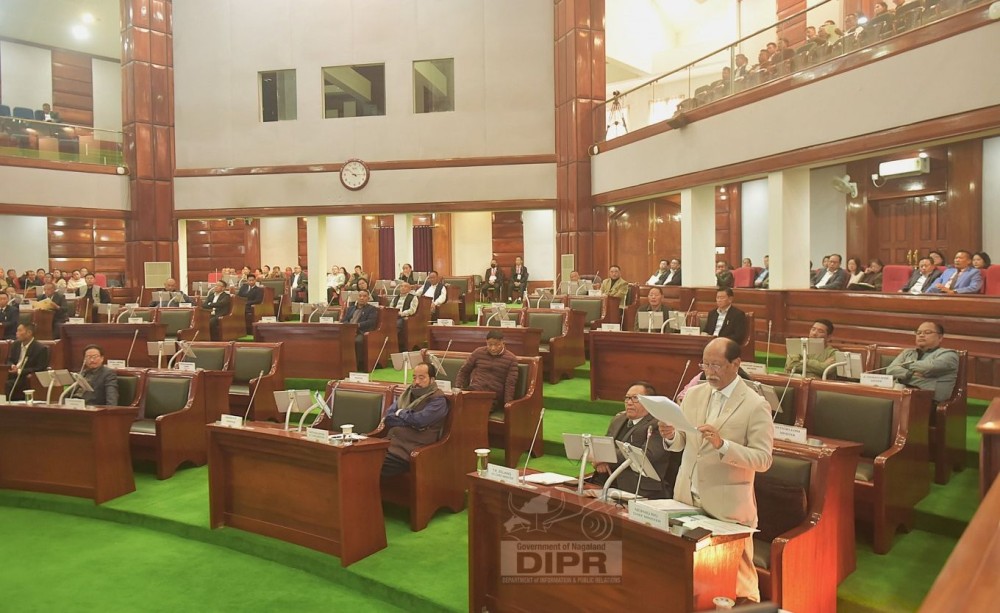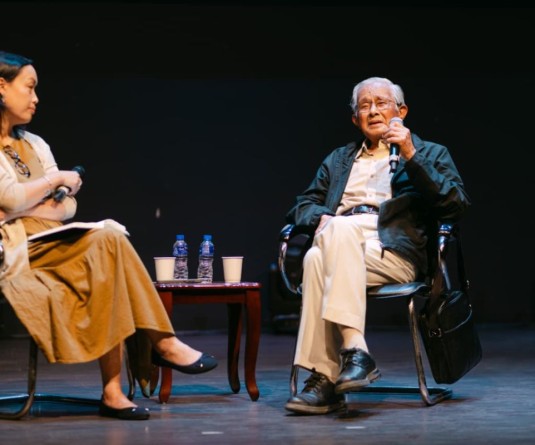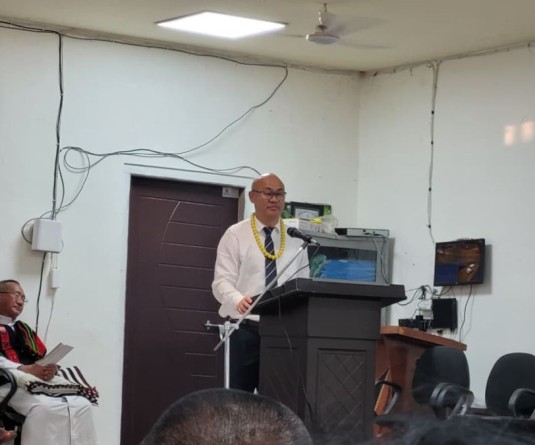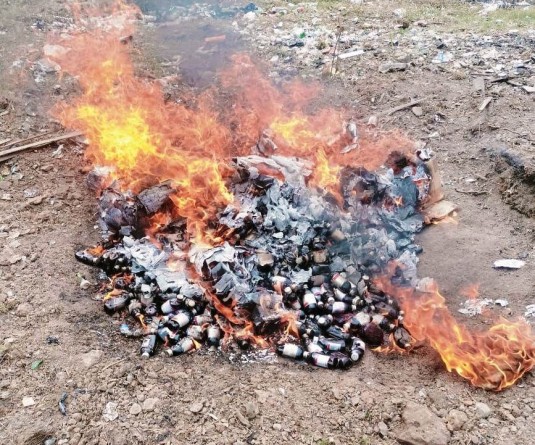Nagaland Chief Minister, Dr Neiphiu Rio presents a statement on the matter of ‘One Nation One Election" at the Sixth Session of the 14th Nagaland Legislative Assembly at NLA hall, Kohima on March 8. (DIPR Photo)

Wait for Union’s Joint Parliamentary Committee, suggests CM Rio
NPF Achumbemo Kikon conveys strong objection
Our Correspondent
Kohima | March 8
Nagaland’s Chief Minister Dr Neiphiu Rio told the sixth session of 14th Nagaland Legislative Assembly (NLA) that as the “One Nation One Election” (ONOE) Bill is being considered by a Joint Parliamentary Committee (JPC) at the Union, it would be may any decisive comment on the matter.
“As the Bill is being considered by a JPC constituted by the Speaker of the Lok Sabha, it may be improper to make any further comment on the matter,” he stated, when the matter was discussed during the “Calling Attention To Matters Of Urgent Public Importance under Rule- 54” at the concluding day of the sixth session.
Raising the issue, Achumbemo Kikon had earlier urged the NLA Speaker the ONOE be “thoroughly discussed and debated in earnest in this house at the appropriate time.
Meanwhile, CM Rio highlighted that the ONOE was proposed to be introduced in the country through the 129th Constitutional Amendment Bill introduced in Lok Sabha on December 17, 2024.
After contentious debate in Parliament, the Lok Sabha Speaker Om Birla forwarded the Bill to the JPC comprising of 27 Lok Sabha and 12 Rajya Sabha members, he said.
So far, the JPC has met twice -January 8 and February 25, 2025 to discuss the feasibility of its implementation, he added.
However, the final recommendation of the Bill, based on the recommendations of an 8-member High-Level Committee headed former President of India Ram Nath Kovind, is yet to be made, CM Rio stressed. The Committee had submitted its recommendations to the President on March 14, 2024.
CM Rio, meanwhile, stated that simultaneous elections were the norm from the first General Election in 1951 until 1967, but thereafter there were early dissolutions of state assemblies which led to staggered polls being conducted for Lok Sabha and Legislative Assemblies, he noted.
Efforts to revive the system have been debated for decades, with proposals from the Election Commission in 1983, the Law Commission in 1999 and Niti Aayog in 2017, he added.
The Law Commission of India in its 170th report, on “Reform of the Electoral Laws” has also suggested that holding separate elections for the State Legislative Assemblies should be an exception, rather than the rule, CM Rio pointed out.
Touching on implication on the term of the NLA, he said if the bill is passed during this Lok Sabha (18th Lok Sabha), then the appointed date would be, say sometime in May-June 2029, since that would be the first sitting of the Lok Sabha after a General Election.
Tenure of the 19th Lok Sabha would be May-June 2034 in case the 19th Lok Sabha lasts its full term, he said.
Accordingly, if the Bill is passed as an Act and implemented, the 16th NLA would be only about 14-15 months before simultaneously election, assuming normal completion of 14th and 15th NLA, he implied.
However, he called for refraining from further comment as the Bill is still being considered by the JPC.
Earlier, Kikon registered strong objection to ONOE saying it would invariably defeat the spirit of the federal structure “because India, being a union of states with a federal structure, makes it a direct assault on the very essence and fabric of the democratic features.”
The representative of 40-Bhadhari Assembly Constituency also held that if ONOE is to be introduced, an overhauling of the Indian Constitution will be necessitated, “most probably ending up with the adoption of a system like List Party Proportional Representation (LPPR), which is too complex for the Indian masses.”
He also noted that India has a huge population and a large geographical area, and the majority of its people still live in villages and thus ONOE is still far-fetched for the Indian electorate.
Without a doubt, if simultaneous election is imposed, the relevance of regional political parties would be diminished, as the national agenda will overshadow regional and local issues, Kikon added.
Besides enticing propaganda with the intention of hammering regional political parties ultimately leading to a one-party rule akin to a communist-type government, he held that use of money power and misuse of government machinery would be rampant during elections.
“This will definitely vitiate the atmosphere of free and fair elections, which will be yet another significant threat to Indian democracy,” he added.
Kikon surmised the main reasons of opposition to ONOE as undermining the federal balance enshrined in the Constitution by imposing a centralised electoral framework, eroding the autonomy of states like Nagaland to address local issues through a region-specific mandate, and overshadowing regional agendas with national narratives.
In the case of Nagaland, he also pointed to the challenging terrain that would put strain on administrative resources. While ONOE claims cost savings, the initial expenditure for synchronising infrastructure (e.g., EVMs, voter rolls, etc.) would burden resource-crunched states like Nagaland, which generally rely on central funding for development,”Kikon claimed.
He also contended that the ONOE violates the "basic structure" doctrine by altering the constitutional separation of powers and diluting state’s sovereignty.
“The ongoing peace process vis-à-vis political negotiations and unique constitutional protections (Article 371A) require uninterrupted attention. Frequent elections ensure timely political accountability, whereas ONOE could delay critical decision-making,” he added.
He also expressed concern that the centralised electoral campaigns may sideline Naga-specific issues, including political struggle, in favor of the national party agenda.
To this end, Kikon urged the BJP to re-examine its stand on ONOE and “reflect on how the party has grown stronger today with the support of regional political parties.”






